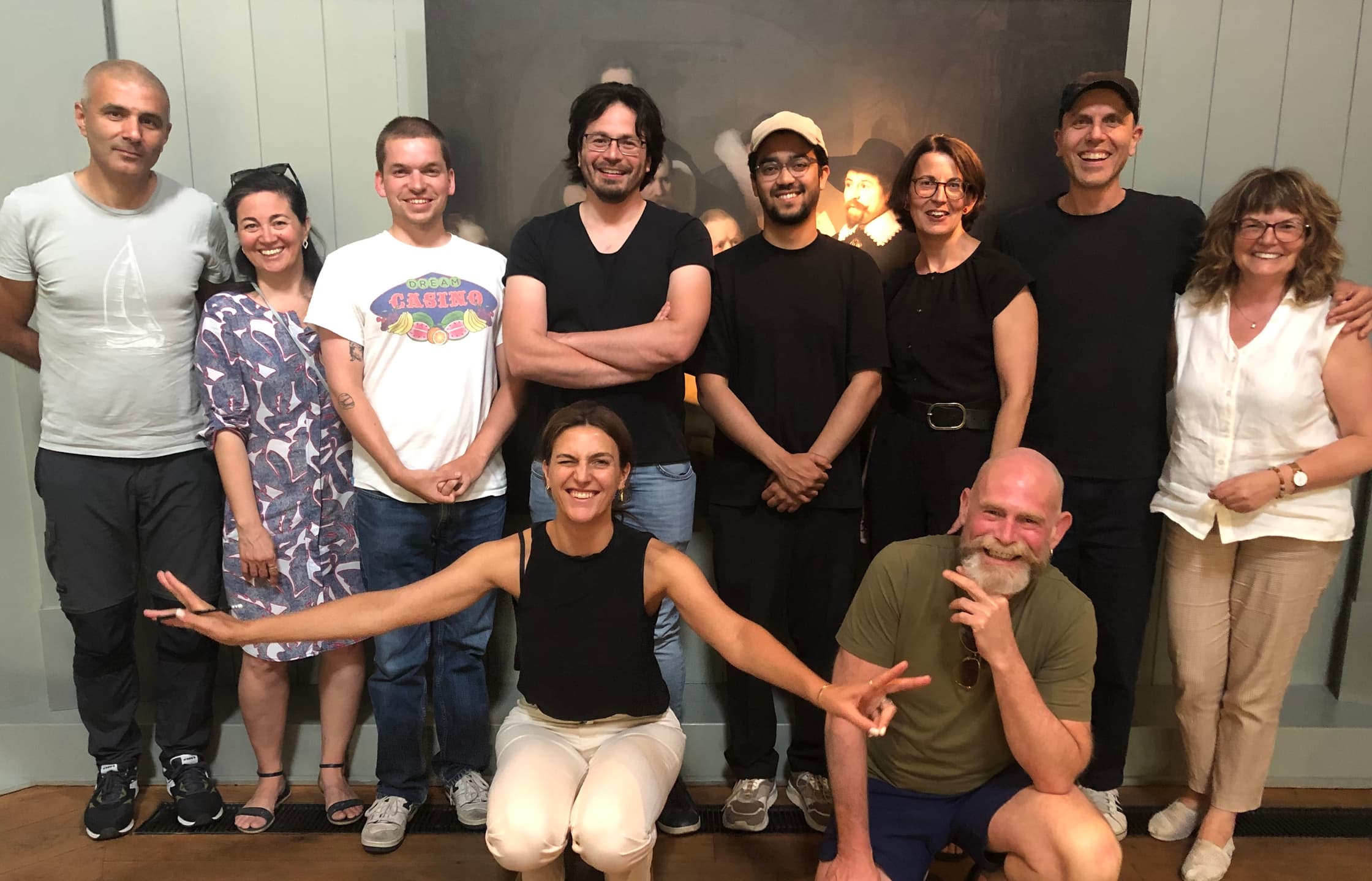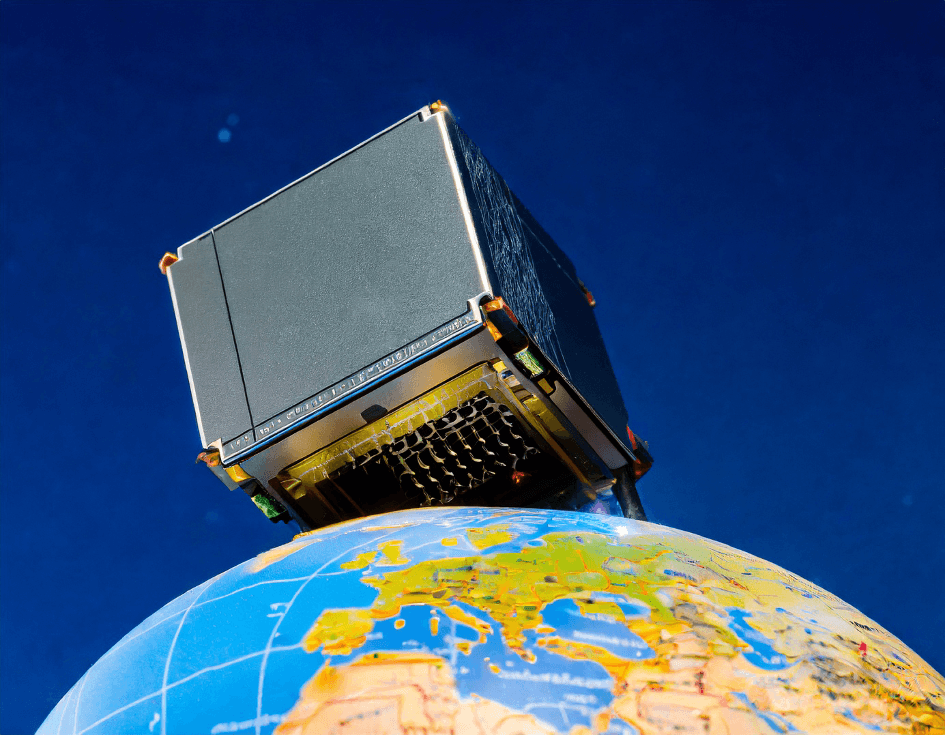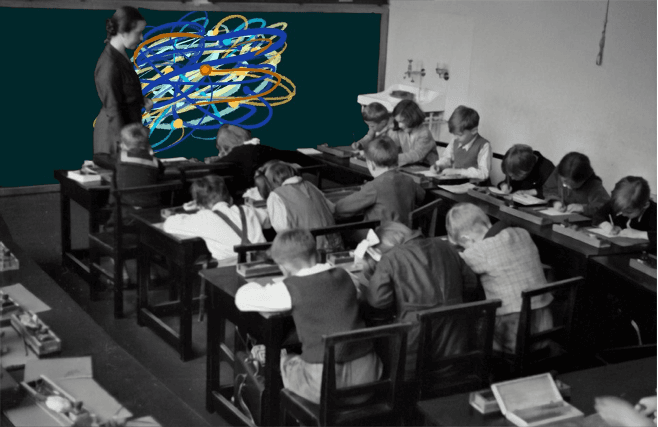On the picture from left to right: Ruken Barış, Esra Üstündağ, Ids Haverkate, Marcus Reitz, Sandipan Nath, Monica Bulacu, Andrija Pavlovic, Albana Shala. In front: Anna Gimbrère and Gary Carter.
The winners of the open call for Quantum's Got Talent 2023 have been announced! This year's prize, a working budget of 3,000 euros and the chance to show the work at Dutch Design Week 2023, has been awarded to Sandipan Nath, Marcus Reitz & Tim Cornelissen and Derek Lomas & Caiseal Beardow (+ team). Honourable mentions went to Joe Beedles and Esra Üstündağ's team.
Quantum's Got Talent is an annual event where Waag Futurelab challenges artists to submit ideas inspired by quantum mechanics and its applications. Important here was that the work was original and reflected on the impact of these scientific developments on society.
The jury included science journalist Anna Gimbrère, quantum musician Andrija Pavlovic, physicist Monica Bulacu and creative officer of Waag Gary Carter.
More about the winners
Sandipan Nath
'It does not matter : Composing with wave functions' is an audiovisual piece that interweaves the intricacies of quantum simulations with the expressive possibilities of spatial sound. Nath draws inspiration from one of the fundamental principles of a quantum mechanical system through which the work focuses on synthesising sound and shifting data from a wave function of a quantum harmonic oscillator. Using open source software, Nath moulds the elusive essence of waves into his customised spatial audio framework, creating an ever-changing and dynamic acoustic environment.
Marcus Reitz & Tim Cornelissen
'Cooling down a Quantum Harmony' aims to explore the dual nature of
quantum computing - deterministic and probabilistic - in an immersive, interactive musical composition. Anchored in the principles of quantum mechanics, the concept envisages an encounter between the quantum and musical worlds, where quantum concepts are part of the composition process and live performance. "Cooling down a Quantum Harmony" is an exploration of the effect of introducing a notion of fundamental uncertainties into the musical practice of composing and performing.
Derek Lomas, Caiseal Beardow, Wendy Wen, George Profitiliotis, Jasha van der Wel, Safa Kamdideh.
'The Quantum Oracle' is a speculative future design project in the form of a fascinating interactive installation, which is a highlight of the Dutch Design Week 2023 TU Delft exhibition. It immerses visitors in a strange future world of 2050, using the enigmatic power of quantum computing. The Quantum Oracle uniquely interweaves cutting-edge technology and provides access to the QuTech Quantum Inspire quantum computer.
This fusion of future technology and artistic representation aims to inspire and foster a deeper understanding of the extraordinary potential of quantum computing. Using
a unique input device created by interactive development company Icefountain, the installation will use state-of-the-art quantum technology and tangible design to get people thinking about intuitively accessible manifestations of some of quantum physics' most difficult concepts, such as real randomness and wave-particle duality.
Honorable mentions
Joe Beedle
'Additive Duality' is a live audiovisual laser show. Beedle incorporates the concept of the Quantum Synthesiser alongside a full additive synthesis palette. In addition, he explores ideas of complementarity in the manner of Niels Bohr, through an exploration of phase and beat frequency relationships. At the same time, he extends the dimensionality of sound waves by scaling audible frequencies to drive a laser beam that projects the visual counterpart of sound into a physical space. Patterns produced by the laser often resemble atomic nuclei and particle formations, referencing wormholes and vacuum states.
Esra Üstündağ, Kleis Kemperman, Ruken Barış, R. Gökhan Koçer
Titel: 'Traces and Time - The journey of emotions between different minds.' By mixing words, colours and sounds using technology, Traces and Time recreates the journey of emotions between different minds. This is done by using insights from quantum theory. These insights provide clues as to how a particular emotion, such as sadness, can generate words in one human mind that are transformed into images in another. This can be done through both determined and random interactions with existing meanings and memories
More about Quantum Inspire
Quantum's Got Talent is part of the Quantum Inspire project in which Waag, QuTech, Kavli Institute for Nanoscience Discovery, University of Oxford, TU Delft, Netherlands Organisation for Applied Scientific Research, Leiden Institute of Physics and other partners explore what the value and meaning of quantum can be for society. In this way, we give direction to potential quantum applications in sectors such as healthcare, energy, environmental systems, smart materials and more. With support of NWO (Nederlandse Organisatie voor Wetenschappelijk Onderzoek).


